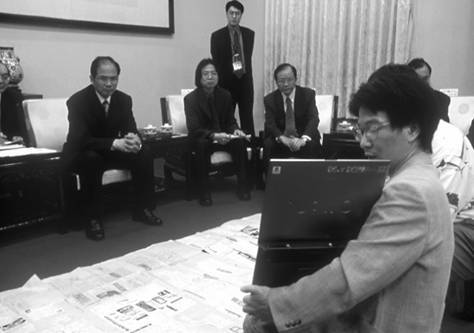October 2, 2002
Taipei, Taiwan
Introduction
We are representatives of the people of Japan, South Korea, Taiwan,
Philippines, India, Germany, Holland, U.S.A. and Russia who have been
struggling against nuclear power plants, nuclear weapons, nuclear waste
dumping, and uranium mining. We have gathered in Taipei for a five-day
international conference, September 28-October 2, 2002, and have
achieved a sense of full trust and solidarity among ourselves.

Meeting with Prime Minister You Shi Kung,
explaining the TEPCO scandal and the danger of BWR
We celebrate the tenth anniversary of the No Nukes Asia Forum (NNAF), an
annual conference that was first convened in Japan in 1993. We are proud
of having participated in and promoted an Asian anti-nuclear movement
over the past ten years. However, the challenge of stopping nuclear
dangers remains.
Despite the worldwide trend of opinion towards phase-out of nuclear
energy, the people of Asia continue to be exposed to fear of nuclear
disaster and radioactive contamination. The greed of multinational
corporations continues to feed nuclear energy expansion; the menace of
nuclear war continues to proliferate.
The Impact of September 11, 2001
After September 11, 2001, the world has become more dangerous place. The
"War on Terrorism" of the Bush administration is involving the world in
an endless and unlimited war, causing imminent crisis in South Asia as
it prepares for war on Iraq. The US is even planning to deploy weapons
using depleted uranium, and to put nuclear power in space. Under the
general circumstances of acceleration of military confrontation, we note
that
1. The horrific events on that day prove the vulnerability of nuclear
facilities. Now no one can guarantee the security of nuclear power
plants and related facilities everywhere on earth.
2. We are alarmed at Japan's policy of promoting the utilization of
plutonium fuel, as it contributes to the potential for nuclear weapons
proliferation and nuclear terrorism, and heightens existing tensions in
the Asia and Pacific region, as well as throughout the world.
The Escalating Dangers of Nuclear Contamination and Catastrophes
1. Earthquakes Though many of our countries are located in regions of
high seismic activity, there are numbers of nuclear reactors and
facilities in operation in these regions. Despite this danger, shown
clearly by recent devastating earthquakes in Osaka and central Taiwan,
there are further construction plans underway in at least Japan, North
Korea, South Korea, and Taiwan.
2. Coverups There have been defects discovered and accidents at nuclear
facilities in Japan, Korea, Taiwan, and India. Especially, we have been
alarmed by the recently-revealed cover-up and falsification of reports
on the cracking on boiling water reactors (BWRs) of Tokyo Electric Power
Company (TEPCO) and three other utilities in Japan. It is also a scandal
that very little of this news has been reported to the Taiwanese people,
whose current reactors and those under construction share the same BWR
construction.
3. Cost-Cutting Increasing carelessness in the nuclear energy industry
under pressure of cost cutting has already been seen. September 30 was
the third anniversary of the JCO criticality accident in Tokaimura,
Japan. We express our solemn prayers for the two victims who were killed
after receiving lethal doses on the spot; more than 600 others were
exposed to radiation as well and many are suffering from radiation
effects on their health. We fear the potential for a catastrophic
accident on the scale of the Three Mile Island in the US in 1979, or the
Chernobyl disaster in former Soviet Union in 1986.
4. Accumulating Nuclear Waste There is no safe solution for the
disposition of nuclear waste, which continues to pile up. With good
reason, people are struggling against radioactive waste dumping
throughout Asia, especially in Orchid Island off the coast of Taiwan, in
Korea, and in Rokkashomura, Japan, as well as at the Yucca mountain site
in the US. The plan for an international waste dumping site in Russia
is a further travesty, compounding current contamination of peoples
there.
5. Injustice to Indigenous Peoples We also note that indigenous
peoples in the world have been long sacrificed both for civil and
military nuclear development. It is urgent to call for the restoration
of their land and human rights immediately.
Progress in the Peoples' Movements Against Nuclear Energy and Nuclear Weapons
The strong peoples' movements in many parts of Asia have succeeded in
stopping nuclear plants in Indonesia, Thailand, and the Philippines, and
waste repository plans in South Korea. In Japan, the victories in
communities like Ashihama, Maki, and Kariwa have served as inspiration
for peoples' struggle against nuclear power plants, and suspended the
MOX (Plutonium and uranium mixed oxide) fuel utilization at reactors in
Japan.
There has been increasing cooperation between the Asia and European, as
well as American, anti-nuclear movements. In addition, we see the
necessity for a strong and dynamic women's involvement and initiative in
our movement in Asia.
We resolve that we will further strengthen our grassroots citizens'
solidarity to prevent nuclear energy generation, nuclear weapons
development, nuclear waste dumping, radioactive materials mining, and
other nuclear related activities that damage the health and environment
of this and future generations.
Our Stand
1. We strongly support the Taiwanese people's aspiration for a
non-nuclear homeland policy. We urge the Taiwanese government to abandon
the construction of NPP4 and to decommission the existing nuclear
reactors. We are in solidarity with the Taiwanese people's action to
call for a national referendum on NPP4.
2. The continued storage of nuclear wastes on Orchid Island has put the
lives and the environment of the indigenous Dawu people to great risk.
We request the Taiwan government to seek the speediest and most
judicious solution to this, but not presume to be justified in
contaminating the lands of other countries just because they can pay big
bucks.
3. We demand that the Japanese government abandon its plutonium program,
specifically the restart of the Monju Fast Breeder Reactor and the
startup of the Rokkasho Reprocessing Plant.
4. We call for international solidarity to stop cross-border radioactive
waste dumping, whether to Russia or to other parts of Asia and the
Pacific.
5. We call on all governments to abandon their nuclear energy programs
as soon as possible and move towards a sustainable energy policy.
6. We urge the government of each country to take all possible measures
to care for the victims of radiation, including health care and
compensation.
Resolution Against a Potential United States Strike Against Iraq
7. We express grave apprehension over the unilateralism of the Bush
government as it continues to deploy military troops and facilities in
Asia and the Pacific in the name of its war on terrorism. We strongly
object to a possible U.S. attack on Iraq, which would take countless
innocent lives at the present time plus countless numbers in future
generations through contamination of the land with conventional weapons
tipped with depleted uranium.
8. We are likewise opposed to the deployment of weapons, and especially
nuclear weapons, in space orbit around the earth, by the United
States or by any power. There can be no justification for such
escalation of threat of war and certain additional nuclear contamination
of the atmosphere and broad areas of the earth's surface
We will continue planting seeds of peace not only for ourselves, but
most especially for our children. We commit ourselves to protect our
land and ocean from the violence of nuclear power, for we live by the
bounty of the land and ocean which we hold sacred, which are the most
precious legacy to the future generation.
October 2, 2002
Taipei, Taiwan,
Participants of the 10th No Nukes Asia Forum
Signatures of the Delegates of the 10th No Nukes Asia Forum

NPP4
[Return]